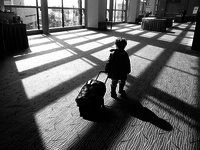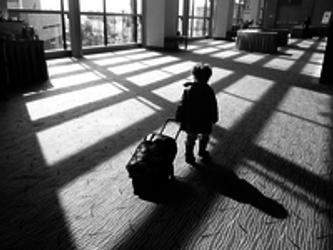Travel Dos and Don'ts When Hitting the Road with a Child with Special Needs
Posted by Rebecca Moore on 12th Apr 2016

Travel Dos and Don'ts When Hitting the Road with a Child with Special Needs
Traveling is hectic for everyone, but for parents of children with special needs, ordinary stress is compounded by fear and worry about how their child will handle the changes and chaotic environments that often accompany travel. If you’re hitting the road with a child with special needs, these dos and don’ts can help both you and your child have a stress-free, fun-filled travel experience.
Do: Have Realistic Expectations
It’s a road trip. They rarely, if ever, go exactly as planned. So, going into your trip without a backup plan or the flexibility to go with the flow and work with whatever obstacles are thrown your way is bound to create a frustrating experience. There’s no point in getting stressed over things that you cannot control, so set your expectations at a realistic level and think of traveling as part of the adventure.
Do: Ask the Right Questions in Advance
Whether you’re staying in a hotel or with family or friends, asking dozens of questions before you plan your trip is a must. Seek out accessible hotels and other accommodations. All hotels must be ADA-compliant, so they must provide accommodations such as wheelchair accessibility, video phones, braille signage or menus, and other accessible features.
Communicate precisely what your child requires. If you’re staying with family, find out what you need to know about their home and plan to take or obtain any special equipment or other items that will make your child’s transition as smooth as possible.
Do: Take Plenty of Appropriate Games, Toys, and Activities
Long road trips and flights can be brutal for children with sensory issues. You can help keep your child relaxed and comfortable by taking enough activities to occupy her through the duration of the trip. Choose luggage with lots of easily accessible pockets so that you don’t have trouble finding comfort items, toys, and activities when you need them. Having these engaging distractions along for the ride will help keep your child comfortable in what can be an uncomfortable situation.
Do: Be Prepared for Tired, Weary Travelers
It might not seem like a long trip in the car should be that tiring for your kids. After all, usually they pass the time playing a game or watching a movie. But any parent who has ever taken a long distance car ride with the kids knows that the disruption of their normal schedule and the hours of monotony can take a serious toll. So, do what you can to make their time in the car as relaxing as possible. Listen to calming music and bring along their favorite pillow and blanket from home. And if your trip will require long bouts of walking—at an amusement park or touring a large city, for example—then be sure to pack a carrier that is comfortable for you and your child. The Piggyback Rider is a great ergonomic option if you have toddler-age children.
Don’t: Let Yourself Get Visibly Stressed Out
Your child can sense your emotions and will play off of your moods. If you’re anxious and stressed out, your child will be anxious and stressed out, too. Don’t forget to utilize your own calming techniques and soothing methods to keep your own emotions in check so that you can be better equipped to meet your child’s needs during travel.
Don’t: Leave Your Child Out of Planning and Decision-Making
It’s so easy to get caught up in creating the perfect travel plans that you may unintentionally leave your child out of planning. Even if there are some decisions that must be set in stone, you can still help your child feel involved by including her in the discussion, offering a choice between two feasible options, and talking with her about the day’s plans.
And if possible be sure to involve your child in your pre-trip prep. From taking care of pre-trip shopping to packing, involving your child in the build up to the trip can help them get used to the idea of being away from home. This transition and planning period can be important for children who have difficulty with abrupt changes in routine.
Traveling has its share of challenges, particularly for parents. Parents of children with special needs know this more than anyone, as busy airports, crowded highways, and irritable children can make travel a dreaded experience. But by opening your mind and setting realistic expectations, your next family trip may just end up being the fun, relaxing experience you all deserve.
Rebecca Moore is currently studying health information science. She created AbleRise.net with a friend with the ultimate goal of fostering community mechanisms for seamless acceptance and assistance for those coping with any measure of disability.

